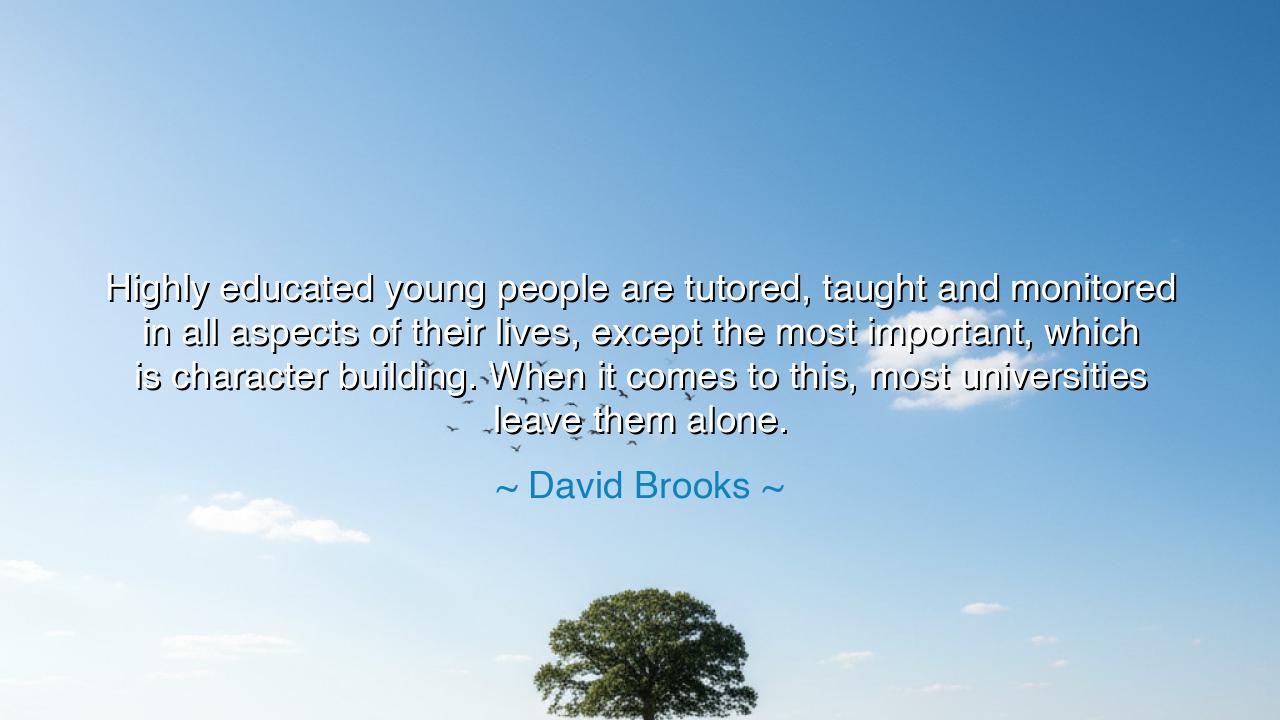
Highly educated young people are tutored, taught and monitored in
Highly educated young people are tutored, taught and monitored in all aspects of their lives, except the most important, which is character building. When it comes to this, most universities leave them alone.






In the solemn and piercing words of David Brooks, he declares: “Highly educated young people are tutored, taught and monitored in all aspects of their lives, except the most important, which is character building. When it comes to this, most universities leave them alone.” This truth strikes with quiet thunder across the modern age — for though we have filled our schools with learning, we have emptied them of wisdom. The youth are trained to master equations, to analyze texts, to climb ladders of ambition, yet few are guided in how to live well. They emerge brilliant, yet brittle; skilled, yet lost. Brooks’s lament is not merely about education — it is about the soul of a civilization that prizes achievement over virtue, and brilliance over goodness.
When Brooks speaks of the highly educated, he does not mock intelligence, but warns against its idolization. Knowledge, he reminds us, is a tool — powerful, yet amoral. It can build bridges or bombs, heal or destroy, depending on the hands that wield it. To be tutored and taught without learning integrity is to be like a finely crafted sword without a sheath — sharp, dangerous, and unanchored. True education must shape not only the mind, but also the heart; not only the intellect, but also the conscience. For what good is a brilliant mind that cannot tell right from wrong, or a skilled hand that serves only pride?
In the great universities of the world, Brooks sees a generation surrounded by guidance in every domain except the moral one. The young are monitored in their grades, their attendance, their success — yet when it comes to the formation of character, they are left wandering. They are told how to build a résumé, but not how to build a soul. They are trained to compete, but not to care; to excel, but not to endure. Thus, when life tests them — not with exams, but with failure, grief, or moral temptation — they discover that all their learning cannot steady the trembling heart.
This neglect is not new, but it is dangerous. The ancients understood what we have forgotten: that education without virtue is ruin. The philosopher Aristotle taught that the aim of education was not knowledge, but the cultivation of good character. A man, he said, is not truly educated until he knows not only how to think, but how to act rightly. Consider also the example of Marcus Aurelius, emperor and Stoic philosopher. Though ruler of the mightiest empire on earth, he kept his heart humble, guided not by ambition but by duty and moral clarity. His Meditations remain a testament to the truth that wisdom without virtue is hollow, and power without morality is peril.
Brooks’s words remind us that character is not taught by lecture, but by life. It is forged in silence, in struggle, in the difficult choices no teacher can make for us. Universities may teach the theories of ethics, but they cannot cultivate courage, humility, kindness, and self-restraint unless they invite students to practice them. Character grows from facing adversity honestly, from serving others selflessly, from learning to master one’s own desires. It is built in the furnace of failure, when the soul must decide whether to rise with grace or fall into bitterness.
Let this, then, be the teaching for the generations to come: seek not only to be learned, but to be good. If your mind is vast but your heart is empty, your knowledge will be barren. If you master the sciences but forget compassion, you will build a cold and restless world. Therefore, nurture your intellect with study, but your soul with virtue. Read deeply, but also live deeply. Reflect, serve, and love. Seek teachers who shape your conscience as much as your comprehension.
For in the end, when the applause of achievement fades, what remains is not your résumé, but your character — the unseen architecture of your soul. David Brooks, like the sages of old, calls us to remember this: that the true purpose of education is not to make us successful, but to make us whole. So let the schools of the future once more teach what is eternal — that wisdom is greater than knowledge, goodness greater than greatness, and virtue the highest form of victory.






AAdministratorAdministrator
Welcome, honored guests. Please leave a comment, we will respond soon